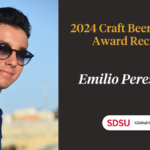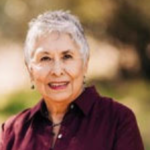
Melissa Halas-Liang
Are you a personal trainer, group fitness instructor, or other health and wellness professional wanting to gain expertise in advising your clients on nutrition? Or perhaps you’re seeking nutrition information for personal wellness. The College of Extended Studies’ Professional Certificate in Nutrition for Optimal Health and Wellness is designed especially for you.
This online certificate program provides an in-depth examination of advanced nutrition, vitamin/protein supplementation, functional food implementation, antioxidants, and meal-plan analysis for optimal performance. Guiding your educational journey is instructor Melissa Halas-Liang.
Give us a brief history of your education and career, and how you came to be an instructor for SDSU’s online Nutrition for Optimal Health and Wellness Certificate program.
I started out in clinical, and eventually became a critical care dietitian with a certified nutrition support specialist credential and later became a clinical nutrition manager. I loved teaching dietitians, nurses, pharmacists, and physicians about insulin and electrolyte management in nutrition support. To keep my skills diverse, I worked side jobs teaching diabetes, wellness, and weight management classes, which lead me to my Certified Diabetes Educator (CDE) credential. I also volunteered in the community and counseled patients occasionally.
Then over 13 years ago I started teaching at SDSU’s College of Extended Studies. Later, after having a child, I had a creative idea and felt like I was on a mission to solve it! I saw the need to influence moms to feed their kids healthier, show them the light, so to speak, and the tremendous physical and mental benefits a child and family can achieve through living nutritionally fit. The goal was to “save the world, one healthy food at a time.” So I started SuperKidsNutrition.com and then later MelissasHealthyLiving.com. I continued to teach because I love staying up-to-date, informed, and providing evidence-based resources to help offset all the nutrition fads and myths that circulate on the Internet.
Who are your students?
I have many different types of students. Many are personal trainers, but I also have wellness directors, MBAs, and nurses, looking to better develop their institution’s program. Some attend for CEUs and I do get the occasional person who decides to take the course to improve their life or is exploring a new degree and wants to gain some exposure to nutrition material before further investing.
What’s the duration of each course and how many hours per week can students expect to invest?
I always say you get what you give. The more students put into their class discussion questions and reading my feedback with additional education links, the more they get out of it. But the goal is to finish within eight weeks and work at a pace that works with your lifestyle and schedule.
Are there common “aha” moments that students typically have?
Yes! I think the biggest aha moment is when they realize how so many popular diet books are really recycled fads with no science behind them. This is usually after their written project and I love when they come to the realization that it’s so easy to twist the science and make a claim sound true.
Do you ever hear back from students on how the program helped them achieve their goals?
Yes, I have had many students over the years send me emails that it’s changed their lives, and the way they eat and practice their lifestyle. That’s why I’m still teaching. It’s a huge time investment — developing and updating the courses. I teach because I love it.
Your website says you combine an evidence-based and holistic approach to help clients reach their health goals. Can you give an example?
There is a spiritual component to good health. We need to feel connected to a greater good and be with nature. Sometimes a simple cure for a bad mood can be going for a hike, getting some fresh air and being surrounded by trees! In our busy tech-savvy world, we forget that sometimes. The best thing about learning online is you can do it from anywhere with Internet — even the beach or local park!
Your website also says your philosophy is that regardless of one’s food habits, small changes can build momentum for lasting changes. What are three small changes everyone could make?
1. After your alarm clock sounds and before life gets a hold of you, take a minute to reflect on what you want to accomplish with your day. You could set a simple food-related goal, such as eating an extra fruit or vegetable with each meal, or an emotional well-being goal, such as gratitude for your family or work. Find a way to remind yourself of this goal so that when the craziness of the day is in full swing, you still can take yourself back to that peaceful morning moment. Try writing your positive intention on a Post-it note and stick it to your mirror, your fridge, or your phone.
2. Try carrying a water bottle with you to track how much water you drink throughout the day. Proper hydration benefits our bodies in a multitude of ways. Water can help us achieve satiety so that we’re less likely to over-eat, it helps maintain the flow of the digestive system, and it plumps up skin cells which aids in our appearance. Additionally, becoming excessively dehydrated can actually impact our cognitive performance, so grab a bottle and drink to that!
3. If your tummy starts talking to you before you’re ready for lunch or dinner, keep your energy up with some feel-good foods. Healthy snacks that are easy to keep on hand include fresh fruit, nuts and seeds, and dried edamame. Try some almond butter on apple slices, low-fat cheese on whole grain crackers, or hummus with bell peppers. These snacks provide healthful fiber, protein, vitamins and minerals that will sustain good health verses the typical highly refined snacks with either added sugar or salt that most Americans snack on.
Where does your passion for eating healthfully come from? Were your parents an influence?
Yes, my parents were and I’m so grateful for this and still thank them for this today. My dad liked to shoot hoops, play catch with me, or take me to the batting cage. My mom made walks, weights, and now yoga a part of her daily life.
What do you think are the biggest benefits of online learning?
The convenience of it all!
This online program also offers a second certificate option: Nutrition for Optimal Health, Wellness and Sports. Learn more at neverstoplearning.net/nutrition.




